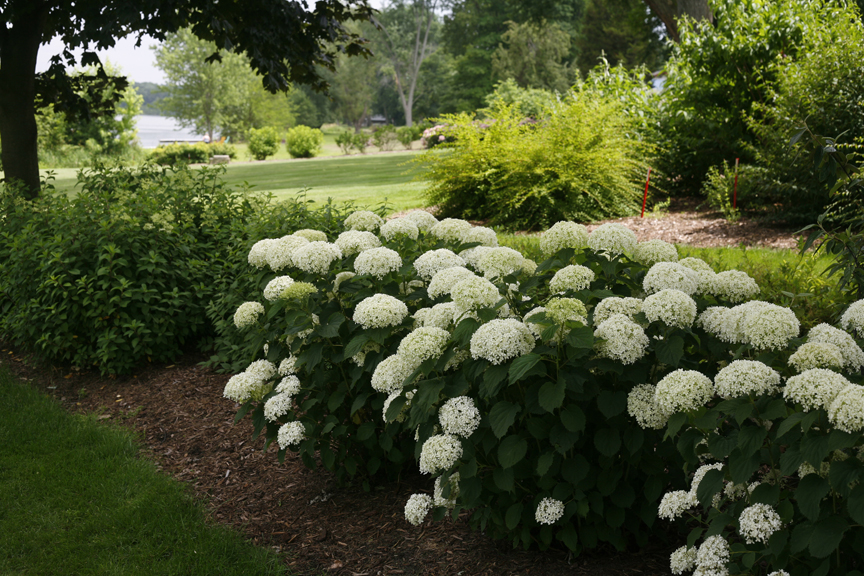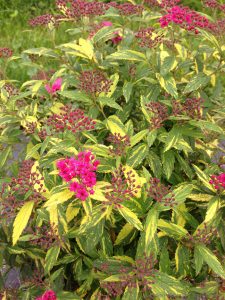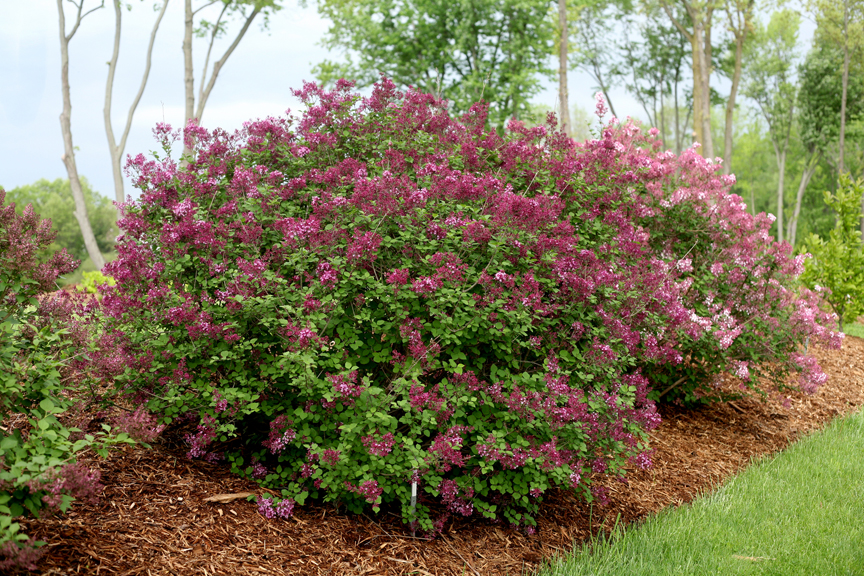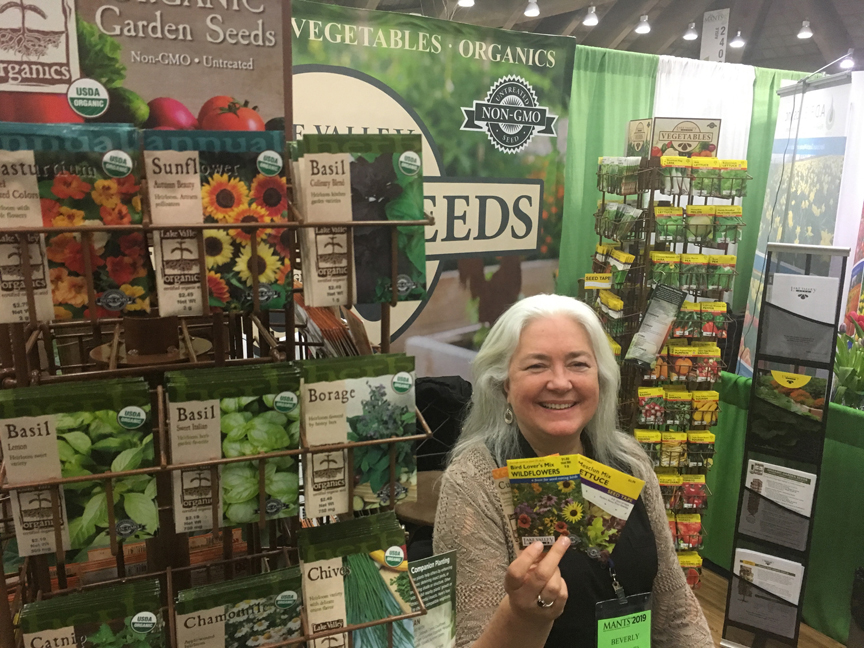Garden trends revealed at Mid Atlantic Nursery Trade Show
Posted on: January 17, 2019 | Written By: Doug Oster |
The aisles were crowded and the conversations friendly at the Mid Atlantic Nursery Trade Show in Baltimore, where many old friends met for this annual event. It’s a place where the customers are garden centers and nursery owners, looking for something new or better for their business. With more than 1,500 booths it can be overwhelming.
For me, it’s a chance to see what’s trending in the industry and gives me a chance to pick the brains of manufacturers, distributors, plantsmen and others about what will be available for gardeners this spring.

‘Invinsibelle Limetta’ hydrangea from Proven Winners ColorChoice Shrubs is a reliable bloomer in the midwest.

Spirea ‘Double Play Painted Lady’ is a reblooming spirea from Proven Winners ColorChoice Shrubs
My first stop was the Proven Winners booth. They supply a wide range of perennials, shrubs, annuals and other plant material to retailers across the country. Tim Wood, horticulturist for the company, is all smiles as he peruses a catalog filled with hundreds of plants, looking for varieties to discuss.
“I picked a spirea, believe it or not. It’s a workhorse in the garden,” he says of the first variety.
But these aren’t your grandmother’s spirea, as breeders from PW are making the spring foliage more interesting, turning the plant into more than a one-trick pony.
“What we’re doing is really concentrating on what does the plant look like when it’s not in bloom,” he says. “You’ve got a whole season to look at a plant; we really try to find plants that have interesting foliage, form and texture. The flowers become the icing on the cake.”
‘Double Play’ is a series with colorful leaves that stays small (18 to 24 inches) with reddish pink flowers in late May or early June with the same toughness as the older cultivars. In general, Wood says, gardeners are looking for smaller, more manageable shrubs.
“They want plants that are well behaved,” Wood says, “(that) don’t need a lot of pruning, are easy to maintain but with lots of color.”

Lilac ‘Blomerang Dark Purple’ is a reblooming lilac from Proven Winners ColorChoice Shrubs
The company is also spending lots of time breeding plants that bloom more than once.
‘Bloomerang’ is a lilac that can bloom three or four times during the year. ‘Sonic Bloom’ weigela grows from four to six feet tall and is covered in flowers for months instead of weeks without deadheading.
When the conversation turns to hydrangeas, Wood warns Midwest gardeners to think native if reliable blooms are desired.
“You may know ‘Annabelle,’ you see it everywhere in white,” Wood says. “We now have it in a series called ‘Invincibelle.’ They are just so easy to grow, they come in a range of colors.”
That means red, pink, purple and green.
“‘Invincibelle Limetta’ has beautiful chartreuse green flowers, it glows when it blooms,” he says.
Once they are done blooming, they can be trimmed and will actually bloom again.
“Don’t be afraid to plant a shrub, they are just perennials with wood on them,” he says with a laugh. “If you put it in the wrong place, you can move them.”
Jeremy Gruszka, a Pittsburgher and the regional sales manager for 2Plant International, shows off a foliage plant that’s starting to become popular. Senecio ‘Angel Wings’ has silvery white foliage and can be grown indoors or outdoors as an annual. It grows 10 to 12 inches tall and will reach about 10 inches wide.
“It is also great as a combination planter, with heuchera or other nice textured foliage plants,” he says. “It has a very velvety leaf, similar to a lamb’s ear.”
He adds to keep it on the dry side, and it loves full sun and heat.
Native plants continue to grow in popularity, which was evident at the show. Kurt Kurzmiller is co-owner of Mid Atlantic Native Plants in Virginia, and this is the second year the company has exhibited at the show.
“If you want to save the pollinators,” he says, “they are more than likely going to be feeding on native plants.”
All his plants are grown organically, which is another critical step to assist beneficial insects.
“Having plants that aren’t sprayed with insecticides is important if you want to save humanity,” he says. “If there’s no pollination, there’s no humans.”
Natives are plants that were already growing here before Europeans came to America. There are many beautiful and tough cultivars that will thrive in our gardens. Kurzmiller mentions several cultivars of black-eyed Susans as a good starting point for gardeners. Milkweed (for monarch butterflies) and red and blue lobelia, penstemons, columbine, false blue indigo, blazing star and all the bee balms just scratch the surface of his long list of plants. Verbena hastata has beautiful purple flowers and can reach six feet tall. It’s a summer bloomer (in full sun) that loves wet feet.
“The plants require a whole lot less,” he says. “They’ve been here forever; they’re adapted already.”
“This is where the industry is going,” he says. “People realize that the bee decline is from neonicotinoids (a type of commonly used pesticide).”
During a media breakfast, Andrew Pidgeon from FibreDust/Enroot Products introduced Gift Wrap That Grows to a group of jaded journalists. It’s literally the gift (wrap) that keeps on giving. The wrapping is made from 100 percent recycled paper that is embedded with hundreds of wildflower seeds. It’s sold with six gift cards, a bundle of natural raffia and provides enough paper to wrap eight shirt boxes. Once the presents are unwrapped, the paper acts as a large seed tape and can be planted.
The soil is prepared by loosening or putting down a layer of compost. Apply the paper and cover with a thin layer of compost or good garden soils and wait for the seeds to sprout. It would be a fun way to give gifts to your favorite gardener.

Beverly Yates of Lake Valley Seed Company discusses trends in the seed business at the Mid Atlantic Nursery Trade Show in Baltimore.
At the Lake Valley Seed booth, Beverly Yates, marketing manager for the company, is discussing trends for the seed business.
“Seed sales continue to be robust,” she says. “Pollinators are very popular. People are now in tune with the fact that birds are pollinators, too.”
Creating bird-friendly environments has become popular.
“Echinacea is really good,” she says, “anything that has a good bunch of seeds that will stay on the head.”
That includes cornflower, shasta daisies, cosmos, coreopsis and many others that are part of a Wildflowers Bird Lovers Mix packet. The idea is to leave the seed heads intact over the winter to provide food for the birds.
For urban growers, it’s about plants that don’t take up a lot of space, but produce lots of fruit. Pole beans and indeterminate tomatoes can be grown vertically.
“‘Sweet 100’ tomato, ‘Spacemaster’ cucumber, ‘Kentucky Wonder’ pole beans are good examples,” she says. “If you only have a patio and you want to grow food, don’t just grow it because it’s pretty.
“If you’re trying to feed yourself, grow something that’s going to continue and get as much produce as possible.”
Yates also heard from lots of gardeners dealing with weather patterns they had never seen before, from extremes in temperature to torrential rains.
“Gardening is utterly experimental anyway, it always changes,” she says. “People don’t know what to do, so people are exchanging ideas and sharing information.”
Younger people are gardening too, discovering that it’s not rocket science to garden.
“People now are learning they can actually do it,” Yates says. “You don’t need a Ph.D. to grow a tomato, you just need to follow a few basic guidelines. Then experiment and make it yours.”
Doug Oster is editor of Everybody Gardens, a website operated by 535Media, LLC. Reach him at 412-965-3278 or doster@535mediallc.com. See other stories, videos, blogs, tips and more at everybodygardens.com.
Details:
Proven Winners Hydrangeas Demystified is a great source of information about the plant.
More from Everybody Gardens
A garden for pollinators at the Pittsburgh Zoo.
Audubon Society will help convert your backyard into a wildlife habitat.